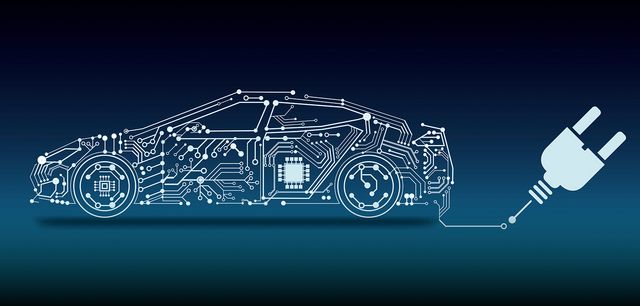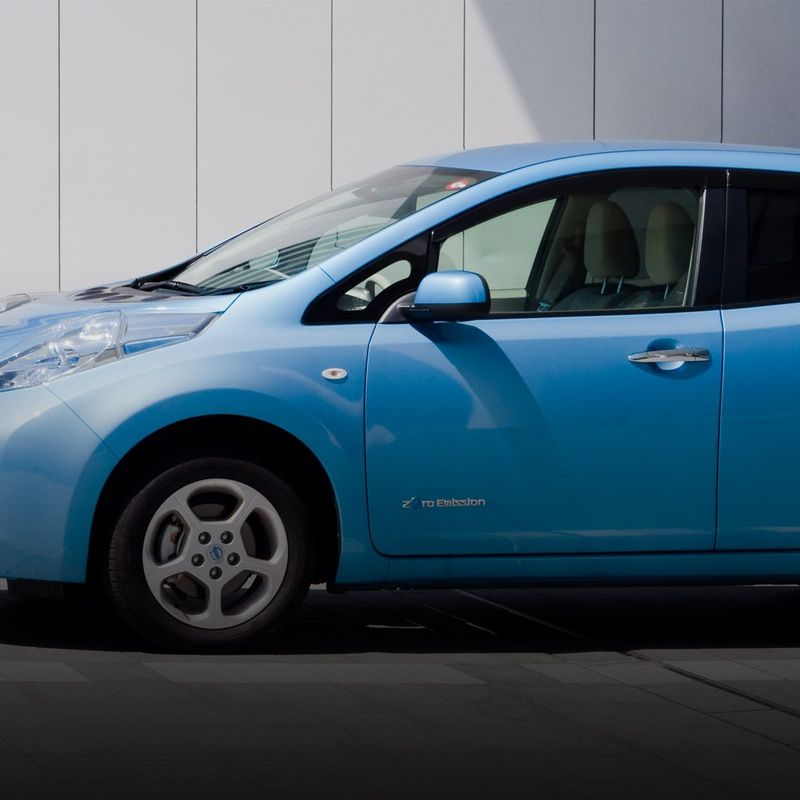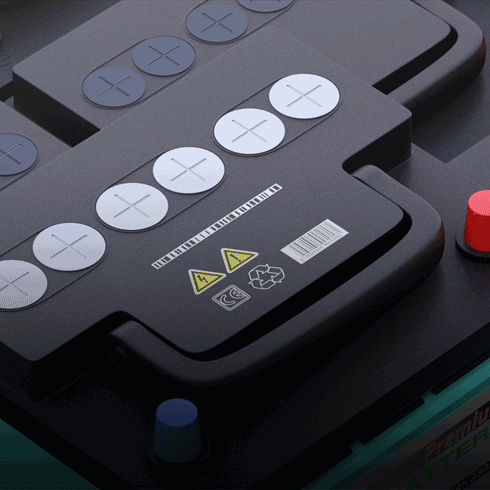22. April 2021
Battery cells for electric cars have mostly been made in Asia for many years. This is something that policymakers and the auto industry want to change. In recent times there has been a surge in announcements concerning battery cell factories and the materials required to make them. Germany, in particular, has the ambition to become the centre of European battery production. Read on for an overview of what is being planned by whom.
Battery cells are at the heart of an electric car – both technically and economically. These energy-rich cells account for around one third of the value added of electrical vehicles. It is for this reason that there has been much discussion in recent years of whether or not battery cell production in Europe would make sense. One traditional argument is that local wage and energy costs are too high and the technological advantages of the Asian manufacturers too great for domestic production to pay off. On the other hand, there is a growing desire not to leave the field to Asian producers and to find a reliable way to meet the growing demands of domestic carmakers. Political moves have now created new facts on the ground: at the end of 2019, the European Commission declared battery cell production to be an “important project of common European interest” or “IPCEI” for short, meaning that it can now be subsidised by Germany and other EU member states to the tune of billions of euros.
The treatment of raw materials, the production of battery cells and the recycling of old batteries will in the future take place in Europe. “In the future, the most innovative and environmentally friendly battery cells will come from Europe, and tens of thousands of jobs will be created along the value chain,” says Federal Economics Minister Peter Altmaier of the eventual objective. The European Battery Alliance estimates that hundreds of thousands of jobs could be created in the battery industry, and the market for electric car batteries from Europe could grow to up to 250 billion euros by 2035. With their battery-oriented jobs offensive, policymakers also aim to compensate for the job losses at car manufacturers and suppliers which are expected in the wake of the technological transformation. After all, an electric car is simpler and requires fewer components and work stages than a conventional internal combustion vehicle.
At the end of January, the European Commission approved the second round of IPCEI funding. Nearly 60 companies from twelve EU countries are currently involved in the two funding projects, among them 15 companies in Germany alone – including BASF, BMW, Varta and Tesla. The Federal Ministry for Economic Affairs and Energy is funding these projects to the tune of almost three billion euros, with a further two billion coming from other sources. For their part, the companies aim to invest around eight billion euros, creating 10,000 jobs in the process. According to the ministry, the intention is to create production capacities for battery cells amounting to more than 180 gigawatt hours. But battery cell production in Germany is also picking up speed outside the IPCEI. Both German carmakers and Chinese manufacturers are starting to ramp up the creation of battery cell factories in the Federal Republic.
Arnstadt: CATL
Construction has been underway in Arnstadt since October 2019, and Chinese battery giant CATL plans to commission its new factory at the Erfurt motorway intersection in mid-2022. The group is investing 1.8 billion euros in its first battery cell factory outside China. The intention in the medium term is to employ 2,000 workers to produce electric car batteries with a capacity of 14 gigawatt hours (GWh). A later expansion to 24 GWh is planned. CATL wants not only to manufacture battery cells in Arnstadt, but also to develop them. The group justifies its decision to opt for the state of Thuringia by appeals to its central location in Germany and Europe, its well-developed transport and research infrastructure and its proximity to major car manufacturers. The proximity to BMW may have played a particularly decisive role in this decision. The Bavarian carmaker has a stake in CATL and has ordered battery cells from the Chinese to the tune of 7.3 billion euros, to be delivered by 2030. The carmaker’s domestically produced electric vehicles are to be fitted with cells from Arnstadt. BMW has been building the i3 in nearby Leipzig since 2013 and will launch the next generation of the electric Mini there in 2023; the new iX is scheduled for production in Dingolfing, and the i4 is already rolling off the production line at the company’s headquarters in Munich.
Bitterfeld-Wolfen: Farasis Energy Europe
The town of Bitterfeld-Wolfen has already given the green light but building permission has not yet been obtained. Nevertheless, the European offshoot of the Chinese manufacturer Farasis Energy still intends to start battery cell production in Bitterfeld-Wolfen in 2023. The company is investing 600 million euros in the first stage of development, which is designed to ensure an annual capacity of ten gigawatt hours. The plant will later be expanded to employ 2,000 people in research, development, production, battery assembly and recycling. The first supply contracts have already been signed. For example, the first Turkish electric car, the Togg, is to be equipped with batteries from Bitterfeld-Wolfen. The largest customer is currently Daimler AG, which took a three percent stake in Farasis Energy in 2020. The cells from Bitterfeld-Wolfen are to be assembled by Daimler subsidiary Accumotive in Kamenz, Saxony, and will supply power to models including the Stuttgart-based carmaker’s electric EQ.
© alamyIn Bitterfeld-Wolfen in Saxony-Anhalt, Farasis Energy plans to start production in 2023.
Ellwangen: Varta
When it comes to small lithium-ion batteries, the battery manufacturer from Baden-Württemberg is regarded as a global heavyweight. Varta now also intends to start producing larger battery cells. From the end of this year, the company plans to produce batteries with a new kind of lithium-ion cell on a pilot production line at its headquarters in Ellwangen. The new cells are said to be characterised by an extremely high charging speed and may be used in particular in vehicles in the premium segment and in sports cars. In the HGV sector, their potential use as buffer batteries for a fuel cell propulsion system is under consideration. Varta has been granted 300 million euros in IPCEI funding to develop its battery, the lion’s share having been allocated to the development of the new lithium-ion cell. By the end of 2021, the battery manufacturer plans to create around 1,000 new jobs in Ellwangen and Northern Bavaria. This is a huge leap for Varta, which currently employs around 4,000 people.
© iStockEllwangen in Baden-Wuerttemberg is home to Varta - an established battery manufacturer.
Grünheide: Tesla
Tesla's gigafactory in Grünheide has been sprouting out of the sandy soil of Brandenburg since early last year. Final approval is still pending, and urgent applications from environmental associations have caused repeated delays. Even so, the Californian electric car pioneer is confident that it will be able to start production in July. In the future, the battery cells for Tesla's 3 and Y models might also be built in the factory near Berlin. At a conference with Federal Economics Minister Peter Altmaier in November 2020, Tesla CEO Elon Musk announced plans to build the world's largest battery factory in Grünheide. In the first stage of development, the production capacity is intended to be about 100 gigawatt hours per year, which could later be expanded to 250 gigawatt hours. According to media reports, Tesla is reckoning with the creation of 1,000 jobs at the battery plant – in addition to the 12,000 jobs for the first development stage of the car plant. Whether the planned battery cell factory will actually take on the gigantic proportions that have been announced remains to be seen. One thing is clear, though: Tesla is also being funded with an as-yet-unknown sum under the IPCEI. According to the official announcement of the Federal Ministry of Economic Affairs and Energy, the central goal of Tesla's IPCEI project is “the development and implementation of advanced production and recycling methods for lithium-ion battery cells to significantly reduce the ecological footprint of cells and their unit costs.”
© alamyGruenheide in Brandenburg is planned to be the location of Tesla's planned gigafactory.
Kaiserslautern: Automotive Cells Company
Alongside Germany, France is considered the other principal motive force in the development of European battery cell production. In Kaiserslautern, the neighbouring countries are making common cause: The Opel plant there is to produce battery cells with a total capacity of eight gigawatt hours from 2023. Opel’s French parent company Stellantis (formerly PSA) and Total subsidiary Saft have set up a joint venture by the name of Automotive Cells Company (ACC). In the final expansion stage, a capacity of 24 gigawatt hours is planned with the aim of supplying half a million electric cars annually. 2,000 jobs should be created in the process. At the same time, the consortium is building another 24 GWh factory in Douvrin in northern France. According to the companies, 10 to 15 percent of the future electric car market in Europe could be served from these plants. Of the total project costs of around five billion euros, Germany and France intend to contribute at least 1.3 billion.
© alamyA German-French cooperation is in progress in Kaiserslautern.
Parsdorf: BMW
In Parsdorf near Munich, the Bavarian carmaker plans to produce its own battery cells from 2022. However, these cells are not intended for customer vehicles. Instead, the pilot plant is to produce prototype cells for development and testing purposes. The carmaker is investing 110 million euros, and BMW is being supported by the Federal and state governments to the tune of 60 million euros under the terms of the IPCEI. The car manufacturer is also one of the beneficiaries of the second round of IPCEI funding, but the specific sum is as yet unknown. In this project, BMW intends to develop lithium-ion cells of the “generation after next” and to test solid-state batteries, which are widely held to be one of the most promising battery technologies of the future.
Salzgitter: Volkswagen
The world's second-largest automaker is currently forging what are arguably the world’s most ambitious electric car plans. By 2030, VW plans to have teamed up with partners to operate six battery cell factories in Europe with a total capacity of 240 gigawatt hours. According to Volkswagen, this would be almost twice as many batteries as were needed worldwide in 2020 to build electric cars and hybrids. In Germany, Salzgitter is leading the charge: the production of battery cells is scheduled to start at the Lower Saxony engine plant in 2024 – with an initial production capacity of 16 gigawatt hours. The intention is later to employ 2,000 workers to produce cells with a capacity of 40 gigawatt hours (GWh).
Cells from Sweden
While the battery cells from Salzgitter are destined for the mass market, VW wants to source the cells for its premium vehicles from the gigafactory which battery manufacturer Northvolt is currently building in Skelleftea, northern Sweden. Production is scheduled to start in 2023 and will gradually expand to an annual capacity of up to 40 gigawatts. VW has held a stake in the Swedish company since 2019, and other customers and cooperation partners include Siemens and BMW. The Federal Government has underwritten the construction of the battery cell factory in Skellefteé with a guarantee of 443 million euros to come from state coffers. The Ministry of Economic Affairs and Energy has justified this decision with the claim that this collaboration could secure the purchase of electric car batteries in the long term for German companies.
In-house production plus one-size-fits-all equals cheaper batteries
The two factories in Salzgitter and Skelleftea are to be operated exclusively with green electricity. It is not yet clear where the four other battery cell plants for VW will be built. Recent discussions have pointed to a possible production site at Seat in Spain. VW staff council boss Bernd Osterloh has called for a second site in Germany. In any case, Volkswagen has high ambitions for its own production and an in-house one-size-fits-all cell which will supply the group's first electric cars with energy from 2023. In combination with new production methods and thoroughgoing recycling, the Wolfsburg-based company aims to drastically reduce battery costs: In the entry-level segment, battery costs will be gradually reduced by up to 50 percent, with reductions of up to 30 percent in the volume segment. The giant carmaker is convinced that this will “finally make e-mobility affordable and turn it into the preeminent propulsion technology”.
Schwarzheide: BASF
The groundbreaking ceremony took place in Schwarzheide in November 2020: starting in 2022, BASF plans to produce basic materials for batteries at its Brandenburg site. The plans relate specifically to material for the cathode, i.e., the battery cell’s positive pole. Up to 400,000 electric vehicles are to be supplied annually from Schwarzheide, and 150 local jobs will be created. The chemical company also intends to carry out battery recycling at this site in the future: a pilot plant is to be built by 2022 to recover lithium from old batteries, for example. BASF has been granted funding by the Federal government and the state of Brandenburg to the tune of 175 million euros.
Überherrn: SVolt
The Chinese battery manufacturer SVolt plans to use Saarland-based Überherrn to establish a bridgehead in the European market. Construction is scheduled to start this year, and batteries with a total capacity of six gigawatt hours will be produced at the Linslerfeld site from 2023. Depending on demand, an expansion to up to 24 gigawatt hours is planned. SVolt is also building a module and packing plant in Heusweiler, 30 kilometres away, which is scheduled to go into operation as early as mid-2022. The offshoot of the Chinese carmaker Great Wall Motors intends to invest up to two billion euros in Saarland and to create 2,000 jobs. The state and the Federal government are underwriting the construction projects. SVolt also intends to produce completely cobalt-free battery cells in Überherrn. The first customer for the batteries is the parent company, Great Wall Motors. According to the company, there will also be customers in Europe from 2022 – but SVolt has not yet mentioned any names.
Willstätt: Leclanché
In Willstätt in Baden-Württemberg, Leclanché is already producing battery cells – albeit on a small scale. The Swiss company is now investing 48 million euros into the expansion of the site. By 2022, the current production capacities of one million lithium-ion cells with a total of 200 megawatt hours will be expanded to one gigawatt hour per year. In the final expansion phase, the company plans to produce ten million cells with a total capacity of 2.5 gigawatt hours.






